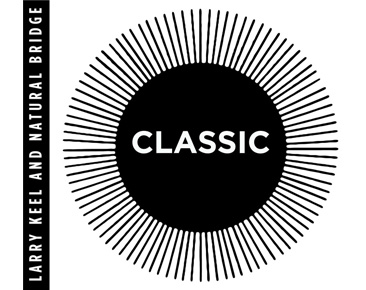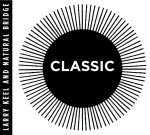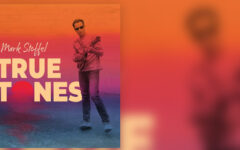
 If you’ve ever lived in New York City, then you know that after some time the place starts to feel like it’s some kind of wonderfully weird, uniquely American experiment – a city where different people, bizarre smells, confused tongues, opposing viewpoints, and incongruous cultural mores are confined to a relatively small island, stacked on top of one another and forced to figure out a way to make it work.
If you’ve ever lived in New York City, then you know that after some time the place starts to feel like it’s some kind of wonderfully weird, uniquely American experiment – a city where different people, bizarre smells, confused tongues, opposing viewpoints, and incongruous cultural mores are confined to a relatively small island, stacked on top of one another and forced to figure out a way to make it work.
In short, a microcosm of America. That’s exactly what Larry Keel & Natural Bridge’s latest album, Classic, is like. In the record’s twelve tracks, Keel and Natural Bridge (Keel’s wife Jenny Keel on bass, Mark Schimick on mandolin, and Will Lee on banjo) take traditional values and infuse them with modern perspectives, butt the sacred up against the secular, unite the hippies with the squares, the stoned with the sober, and mix the simple with the complex to create a microcosm of the broad spectrum of American music, as well as the collective American psyche in 2012 and all the contradictions contained therein. And, they figure out a way to make it work without contrivance.
Nowhere on Classic is this more evident than in the songs How Can it be Wrong and Do Unto Others. The former track, a tale of a farmer who decides to grow marijuana in order to save the family farm, is musically as traditional as anything Bill Monroe ever recorded, but lyrically it’s all twenty-first century thinking.
Mandolin player, Schimick sings:
How can it be wrong if it grows wild
It’ll ease your mind, it’ll make you smile
Have the farm paid off in just a little while
How can it be wrong if it grows wild…
As the song unfolds one can’t help but recall the tragedy that befell Ethan Allen Hawley in William Faulkner’s The Winter of Our Discontent and wonder how great the farmer’s loss will be once he starts down this slippery slope. To be fair, the convenient hippie-logic the farmer uses to rationalize his actions detracts from the poignancy of his plight (let’s face it, the fact that it “grows wild” doesn’t have anything to do with concerns of right or wrong). Regardless, there’s a perspective here you’d be hard pressed to find in any “Traditional” song.
Then, only two tracks later we get Do Unto Others, the record’s most straight-up bluegrass offering. Co-written and sung by Natural Bridge’s banjo player Lee, the song embraces what could only be described as traditional Christian values and would fit seamlessly into WSM’s Sunday Down South playlist or any other religious-themed bluegrass show.
Do unto others as you’d have them do to you
Don’t ever mistreat your fellow man
Show a little kindness and help them if you can
Cause the one created him also created you.
Lee sings in keeping with time-honored religious bluegrass motifs. Not that there’s any kind of inherent contradiction between dealing weed and traditional Christian values but rarely, if ever, in bluegrass have these two seemingly dissimilar points of view been expressed on the same album, separated by only one track. Yet here it seems right – a natural marriage of form and content. Listening to these songs one gets the feeling that Keel and Natural Bridge are trying to take their audience – be they dealers, preachers, criminals, cops, or laypeople – on a journey, show them new ways of looking at disparate perspectives, and ultimately lead them to empathy.
The success of Classic is in no small way due to Keel’s prowess as a player, writer, and interpreter. And the tracks that he either wrote or co-wrote are so well-crafted that after a few passes I started to wonder what would result if Keel, Darrell Scott, and Guy Clark were locked in a room together for a week. Keel is that good of a writer; he ranks up there with the best in Music City. And although his songs are rooted in tradition, Keel is smart enough not to let himself be trapped by it. He is so inside the music that he owns his influences. Indeed, Keel possesses a keen ability to exploit the best of what he hears, knowing just what to borrow, what to update, and what to let stand.
Take the album’s opener, Love, a quasi-call to arms for less reality and more fun that owes a small melodic debt to Jonathan Edwards’ Sunshine. In this song Keel riffs on Edwards’ infectious hook only enough to use it as a launching pad to venture off into new territory. He never lets Edwards’ influence overtake his own musical agenda. Just when you think you’ve got a handle on the tune, Keel steers it to a place you never expect it to go. It’s a wonderful song that inhabits a place somewhere between Jimmy Martin and jamgrass with a near-perfect balance of infectious stay-in-your-head-all-day-melody and virtuosic picking.
It should be pointed out that all Keel’s exploits are made possible by the crackerjack backing of Natural Bridge. They are as tight as can be and if they’re not pushing Keel into new territory, they’re enabling him to go there by providing a solid foundation to which he can return when he finishes his excursions in to the far reaches of traditional American music.
As for the rest of the album, there’s no repetition or filler here so the record never gets tedious. Take the Time and Back up on the Mountain with their easy grooves could easily be contemporary country hits with a few production tweaks and the addition of drums. Flora, an update on the traditional Lily of the West is a song in which Keel gives Grady Martin’s licks in El Paso a run for their money.
In I’m No Doctor, Keel seduces the listener with a groove that plays out like a lazy summer day. B-Funk is a barnburner where we get a full-frontal shot of everybody’s chops. In this track, Keel adroitly blends the staccato of Tony Rice with Django’s vibrato to marvelous effect. Country Blues, a Doc Boggs cover, puts a point on just how far Keel has come down off the mountain so to speak. Keel’s version is every bit as emotionally cast down as Boggs’ but it’s uniquely different because Keel’s expression of disenfranchisement has been informed by sixty or so years of rock & roll, electric blues, spacegrass, and whatever else that’s found its way into his ears. Listening to it one can’t help but wonder if Boggs were alive today and forty years old, would he play it the same way? Then at the opposite end of the spectrum is Put it On, a Bob Marley cover that Keel’s wife Jenny seizes by providing scene-stealing background vocals.
After listening to Classic a few times it becomes clear that Keel thrives on stirring the pot. It’s obvious he pays attention to a lot of music, processes it all without bias, and picks from the best of it. And that open-mindedness is another reason why this record is so solid. Keel is confident enough not to let himself be imprisoned by reactionary bluegrass orthodoxy, but still, echoes of the bluegrass forefathers whose work he studied in his formative years can be heard between the notes of his blazing fretwork if you listen for them. So much so in fact, one could argue that Classic is really a traditional record masquerading as a jamgrass album.
Of course the self-appointed bluegrass intelligentsia won’t see it that way. They’ll hear the opening track and if they bother to listen past it, they’ll do so with half an ear. Their loss. This album is great. It’s a breath of fresh air. The songs move from one to the next to the next like a flowing river and if you listen to the whole record in one sitting you’ll be feeling invigorated by the time it ends. There’s an optimism in the songs that imparts a sense of hope to the listener in a way that a lot of modern music doesn’t – and that is a rare thing. At times, the vibe of the record recalls the best of Glen Campbell, the Stanley Brothers, or John Wesley Ryles.
But don’t let these references give out the wrong impression; Classic is not a derivative work stuck in the quagmire of a romanticized past. It’s forward-thinking, spontaneous, audacious, and full of surprises. Fresh. All Keel and Natural Bridge are doing is watering the seeds the old Masters planted and widening the Circle a little bit. Also, I hear Keel’s a hell of a fisherman.
That said, don’t let Classic be the one that got away.







